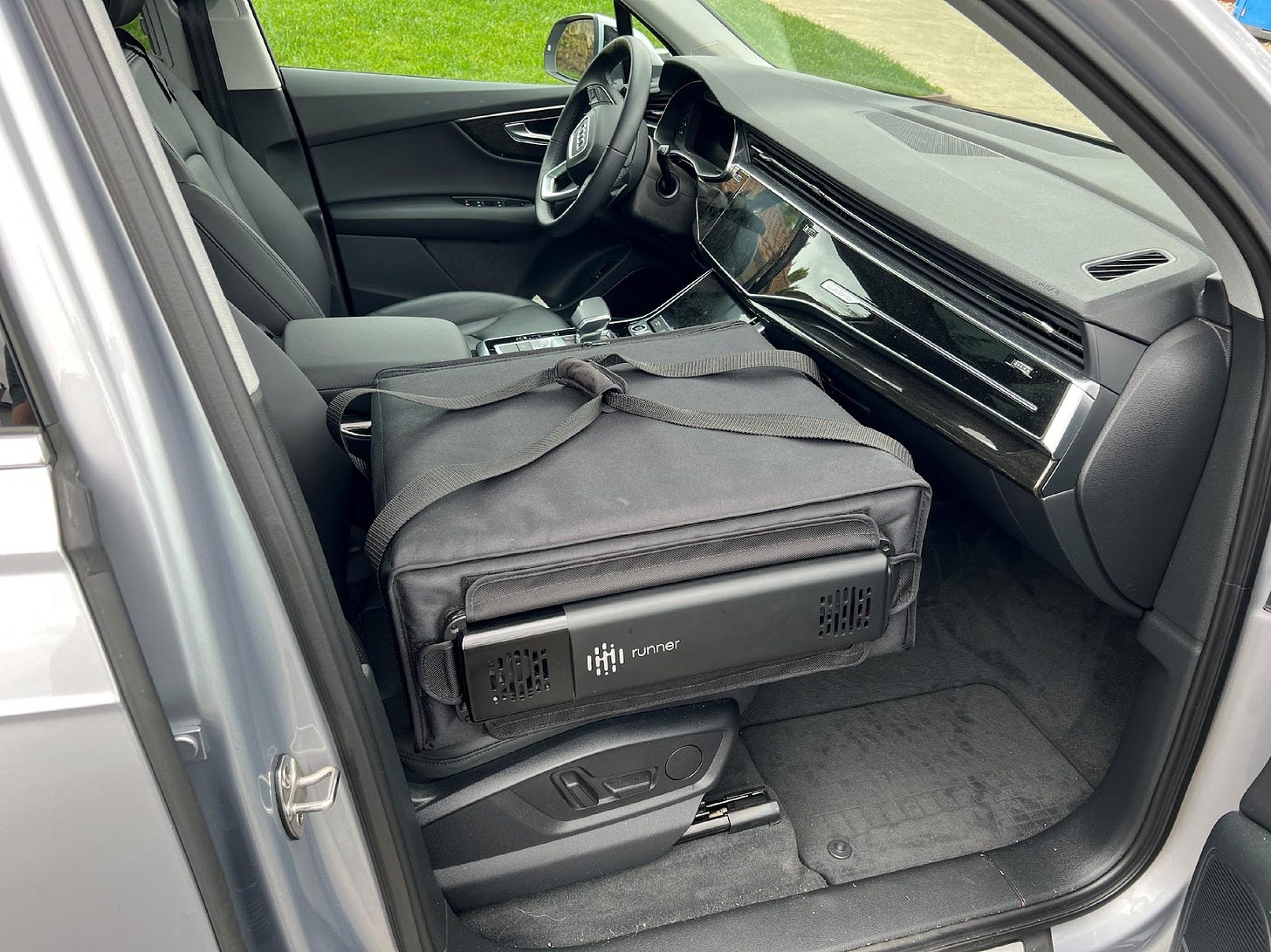Meet Runner: The First Smart Pizza Delivery Bag
Co-Founder Michael Pavel's journey from The Melt to Momentum Labs
The world of pizza delivery never lacks for new inventions; every day it seems like there’s a new app to order on, a new device to bring that pizza to your door, or even a fresh new robot that will cook up that pie all on its own. But one thing hasn’t changed much: the packaging that transports the pizza, which has more or less stayed the same since the thermal bag was invented in the 1980s. Well, the wait might be over! Michael Pavel thinks that pizza connoisseurs should no longer have to put up with a pie that’s just “warmish” and not as good as one served fresh in a restaurant. His company, Momentum Labs, aims to solve the problem with its Runner Smart Delivery Bag.
Michael’s been thinking about food innovation for some time now. From 2013 to 2016 he worked on strategy and analytics for The Melt - the Bay Area grilled cheese startup that VCs poured tens of millions into so that they could learn that a menu of a few simple sandwiches was not enough to sustain a business centered around high-rent office districts. At the time, the company’s tech-focused CEO wanted to launch a delivery program, and Michael was tasked with figuring out how to get still-gooey grilled cheeses into customers’ hands. You can see the proposed solution at the patent office, a somewhat ungainly box complete with an aluminum heatsink and a fan for dealing with steam.
After The Melt, Michael worked at Zerocater, running “Snacks and Kitchens” for corporate clients. But when Covid turned the world of dining on its head, he decided it was time to get back to solving the delivery problem. He linked up with Michael Sprauve, who runs a product development firm, and they set their sites on attacking pizza first, as it’s the “path of least resistance.” Unlike most other delivered foods, pizza is already transported in a unique container, meaning uptake shouldn’t be too difficult among restaurant operators and delivery workers alike.
Building A Better Bag
So how do you improve on a pizza delivery bag? First, temperature - the Runner can get up to 175 degrees fahrenheit, hotter than the temps the status quo can maintain. Second, and more importantly - moisture. In a traditional pizza bag, moisture builds up over time, resulting in soft and overly runny pizza; this also means few chains offer super thin crusts for delivery. The Runner’s electronics monitor the pie to intelligently vent out moisture as necessary, and use both radiant and intake heat to maintain temperature.
Still TBD is battery life. At the moment the device can last through a whole day’s delivery shift, using a combination of battery power, trickle charging from a car’s cigarette lighter port, and full recharging back at the restaurant. But with batteries being a big cost driver in any portable device, the company plans to run trials to see if customers would be better served by less powerful, lighter devices.
Go To Market
Michael has seen that customers that received orders that used the bag found their pizzas to be “dramatically better” than what they’re used to, and thinks that pizza shops involved in the trial will notice that as well. Pavel describes an ideal scenario for the startup, where one of the nationwide chains will want to lock the tech up for an exclusivity period. With this new bag making for improved pizza experiences, the hope is it can be used in a marketing play, with the pizza giant positioning its pies as now outclassing the competition. (A tad reminiscent of the Domino’s “Pizza Turnaround” campaign from a decade ago.)
Otherwise, the company sees the bag delivering value for smaller, regional chains, like Lou Malnati’s, as well. The Runner bag system is equipped with GPS and GIS technology; it’s even been accepted by mapping giant ESRI’s accelerator program. That means there’s potential for smaller companies, that don’t have the “Pizza Tracker” technology of some of the big guys, to realize additional value from the bag, in the form of location updates and automated communications with customers. Either way, Momentum Labs believes it’s delivering enormous value with a bag that will cost $300 to $400 per pop up front, with ongoing replacement costs set to be in line with the old school competition.
What’s Next
Momentum Labs’ ambitions don’t stop with pizza; they’ve tested it on other popular food items as well. “It works on french fries, it works on fried chicken” adds Pavel, nodding to two items that are particularly prone to disappointing customers as soon as they’re tossed in a traditional delivery vessel. With modular components, the technology is size and shape agnostic - the company believes that while “30 minutes is the sweet spot” it can still deliver superior performance for delicate and fried items even with 45 minutes of travel time.
The company has applied for patents in a number of key markets besides America: Canada, the EU, South Korea, Japan, China and Vietnam. Investors see potential as well, with the company having just raised a second angel round that pushes its total funding to “close to a million.” The company’s ambitions are impressive, as it looks to handle the domestic market on its own, while working with established kitchen equipment companies to handle the rest of the world. Sounds like you ought to be seeing a Runner bag powering a pizza delivery near you sometime soon!





